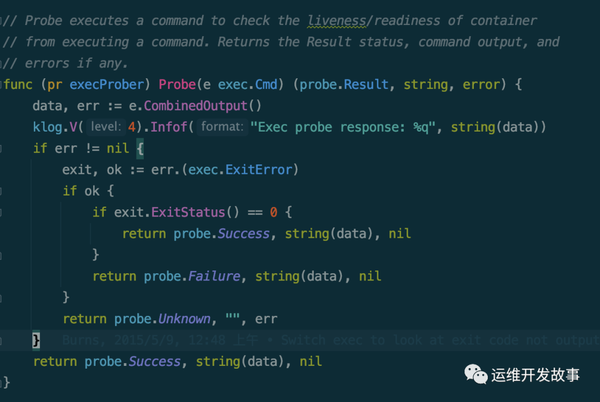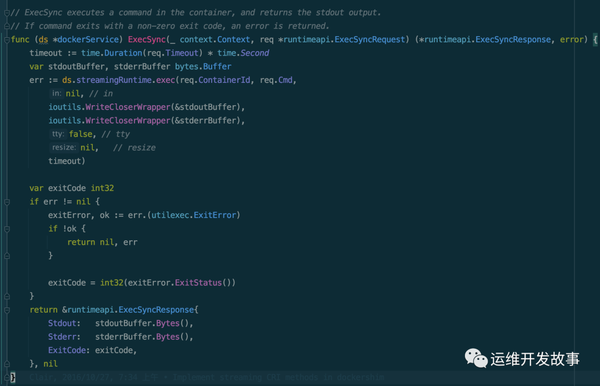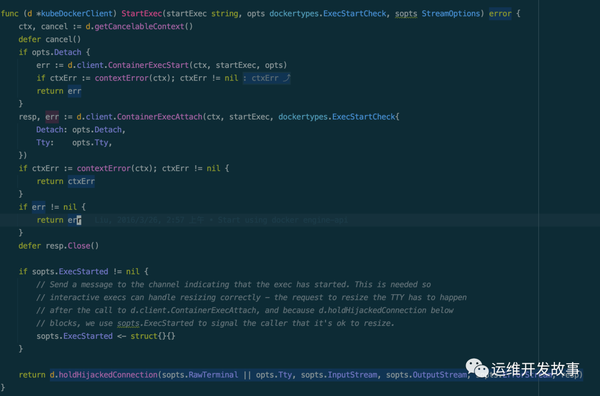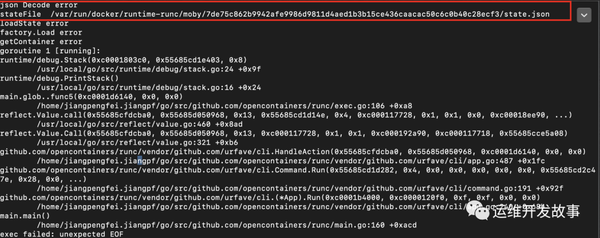Docker EOF问题排查

一、前言
问题排查过程,源码部分均由我的开发同事排查和记录;在征得其同意后,由我发表在此。
二、问题
某天接到客户反馈,pod的事件中出现大量的 warning event: Readiness probe failed: OCI runtime exec failed: exec failed: EOF: unknown。但不影响客户访问该服务。
三、环境
特别说明:客户在负责运行业务的k8s节点上坚持开启了cpu-manager
四、排查
1、接到客户反馈后,检查该pod所在节点的kubelet日志,如下:
I0507 03:43:28.310630 57003 prober.go:112] Readiness probe for "adsfadofadfabdfhaodsfa(d1aab5f0-
ae8f-11eb-a151-080027049c65):c0" failed (failure): OCI runtime exec failed: exec failed: EOF: unknown
I0507 07:08:49.834093 57003 prober.go:112] Readiness probe for "adsfadofadfabdfhaodsfa(a89a158e-
ae8f-11eb-a151-080027049c65):c0" failed (failure): OCI runtime exec failed: exec failed: unexpected EOF: unknown
I0507 10:06:58.307881 57003 prober.go:112] Readiness probe for "adsfadofadfabdfhaodsfa(d1aab5f0-
ae8f-11eb-a151-080027049c65):c0" failed (failure): OCI runtime exec failed: exec failed: EOF: unknown
probe的错误类型为failure,对应代码如下:

2、再查看docker日志,如下:
time="2021-05-06T16:51:40.009989451+08:00" level=error msg="stream copy error: reading from a closed fifo"
time="2021-05-06T16:51:40.010054596+08:00" level=error msg="stream copy error: reading from a closed fifo"
time="2021-05-06T16:51:40.170676532+08:00" level=error msg="Error running exec 8e34e8b910694abe95a467b2936b37635fdabd2f7b7c464d
fef952fa5732aa4e in container: OCI runtime exec failed: exec failed: EOF: unknown"
虽然从Docker日志中显示是 stream copy error,但实际上是底层的 runc 返回了 EOF,导致返回了 error。3、因为日志中显示 probe 类型为 Failure,因此 e.CombinedOutPut() 的 err != nil,并且 ExitStatus 不为 0,data 的值为 OCI runtime exec failed: exec failed: unexpected EOF: unknown,最终会调用到 RunInContainer 方法


ExecSync 是通过 GRPC 调用了 dockershim 的 ExecSync

dockershim 最终调用到 ExecInContainer 方法,并且该方法的返回了 exitcode 不为 0 的 error。
func (*NativeExecHandler) ExecInContainer(client libdocker.Interface, container *dockertypes.ContainerJSON, cmd []string, stdin io.Reader, stdout, stderr io.WriteCloser, tty bool, resize <-chan remotecommand.TerminalSize, timeout time.Duration) error {
execObj, err := client.CreateExec(container.ID, createOpts)
startOpts := dockertypes.ExecStartCheck{Detach: false, Tty: tty}
streamOpts := libdocker.StreamOptions{
InputStream: stdin,
OutputStream: stdout,
ErrorStream: stderr,
RawTerminal: tty,
ExecStarted: execStarted,
err = client.StartExec(execObj.ID, startOpts, streamOpts)
if err != nil {
return err
ticker := time.NewTicker(2 * time.Second)
defer ticker.Stop()
count := 0
for {
inspect, err2 := client.InspectExec(execObj.ID)
if err2 != nil {
return err2
if !inspect.Running {
if inspect.ExitCode != 0 {
err = &dockerExitError{inspect}
break
count++
if count == 5 {
klog.Errorf("Exec session %s in container %s terminated but process still running!", execObj.ID, container.ID)
break
<-ticker.C
return err
ExecInContainer 做了以下几件事:
-
调用 CreateExec 创建 ExecID
-
调用 StartExec 执行 exec,并通过 holdHijackedConnection 来重定向输入输出。将 inputStream 写入到 connection,并将 response stream 重定向到 stdout,stderr。
-
调用 InspectExec 获取本次 exec 的运行状态和 exitcode
那么日志中打印的报错就是 response stream 传递过来的字符流。也就是说,dockerd 的 response 中包含了错误值。

此时去 docker 代码中查找原因,ExecStart 会调用到 dockerd 的以下代码:

根据上面 docker 的日志,err 的错误信息为:OCI runtime exec failed: exec failed: EOF: unknown。也就是说 ContainerExecStart 返回了错误。ContainerExecStart 会调用到 containerd.Exec,也就是 dockerd 和 containerd 之间进行通信

// docker/libcontainerd/client_daemon.go
// Exec creates exec process.
// The containerd client calls Exec to register the exec config in the shim side.
// When the client calls Start, the shim will create stdin fifo if needs. But
// for the container main process, the stdin fifo will be created in Create not
// the Start call. stdinCloseSync channel should be closed after Start exec
// process.
func (c *client) Exec(ctx context.Context, containerID, processID string, spec *specs.Process, withStdin bool, attachStdio StdioCallback) (int, error) {
ctr := c.getContainer(containerID)
if ctr == nil {
return -1, errors.WithStack(newNotFoundError("no such container"))
t := ctr.getTask()
if t == nil {
return -1, errors.WithStack(newInvalidParameterError("container is not running"))
if p := ctr.getProcess(processID); p != nil {
return -1, errors.WithStack(newConflictError("id already in use"))
var (
p containerd.Process
rio cio.IO
err error
stdinCloseSync = make(chan struct{})
fifos := newFIFOSet(ctr.bundleDir, processID, withStdin, spec.Terminal)
defer func() {
if err != nil {
if rio != nil {
rio.Cancel()
rio.Close()
p, err = t.Exec(ctx, processID, spec, func(id string) (cio.IO, error) {
rio, err = c.createIO(fifos, containerID, processID, stdinCloseSync, attachStdio)
return rio, err
if err != nil {
close(stdinCloseSync)
return -1, wrapError(err)
ctr.addProcess(processID, p)
// Signal c.createIO that it can call CloseIO
// the stdin of exec process will be created after p.Start in containerd
defer close(stdinCloseSync)
if err = p.Start(ctx); err != nil {
// use new context for cleanup because old one may be cancelled by user, but leave a timeout to make sure
// we are not waiting forever if containerd is unresponsive or to work around fifo cancelling issues in
// older containerd-shim
ctx, cancel := context.WithTimeout(context.Background(), 45*time.Second)
defer cancel()
p.Delete(ctx)
ctr.deleteProcess(processID)
return -1, wrapError(err)
return int(p.Pid()), nil
这里 new 了一个 FIFOSet,而 reading from a closed fifo 仅出现在 fifo 被 close 掉时,仍然在读取的情况。即 f.Close() 发生在 f.Read() 前面。在外层可以看到
defer func() {
if err != nil {
if rio != nil {
rio.Cancel()
rio.Close() // 这里 Close 会导致 fifo close
p, err = t.Exec(ctx, processID, spec, func(id string) (cio.IO, error) {
rio, err = c.createIO(fifos, containerID, processID, stdinCloseSync, attachStdio)
return rio, err
if err != nil {
close(stdinCloseSync)
return -1, wrapError(err)
ctr.addProcess(processID, p)
// Signal c.createIO that it can call CloseIO
// the stdin of exec process will be created after p.Start in containerd
defer close(stdinCloseSync)
// p.Start 出错,会导致内部的 fifo 关闭,从而导致 reading from a closed fifo 的问题
if err = p.Start(ctx); err != nil {
// use new context for cleanup because old one may be cancelled by user, but leave a timeout to make sure
// we are not waiting forever if containerd is unresponsive or to work around fifo cancelling issues in
// older containerd-shim
ctx, cancel := context.WithTimeout(context.Background(), 45*time.Second)
defer cancel()
p.Delete(ctx)
ctr.deleteProcess(processID)
return -1, wrapError(err)
p.Start 调用到下面的代码,通过 GRPC 和 containerd 通信。
// github.com/containerd/containerd/task.go
func (t *task) Start(ctx context.Context) error {
r, err := t.client.TaskService().Start(ctx, &tasks.StartRequest{
ContainerID: t.id,
if err != nil {
t.io.Cancel()
t.io.Close()
return errdefs.FromGRPC(err)
t.pid = r.Pid
return nil
这个 GRPC 调用会到达 containerd 以下的代码:
func (e *execProcess) start(ctx context.Context) (err error) {
var (
socket *runc.Socket
pidfile = filepath.Join(e.path, fmt.Sprintf("%s.pid", e.id))
if e.stdio.Terminal {
if socket, err = runc.NewTempConsoleSocket(); err != nil {
return errors.Wrap(err, "failed to create runc console socket")
defer socket.Close()
} else if e.stdio.IsNull() {
if e.io, err = runc.NewNullIO(); err != nil {
return errors.Wrap(err, "creating new NULL IO")
} else {
if e.io, err = runc.NewPipeIO(e.parent.IoUID, e.parent.IoGID, withConditionalIO(e.stdio)); err != nil {
return errors.Wrap(err, "failed to create runc io pipes")
opts := &runc.ExecOpts{
PidFile: pidfile,
IO: e.io,
Detach: true,
if socket != nil {
opts.ConsoleSocket = socket
// err 返回了 exec failed: EOF: unknown
// 这里的 runtime 就是 runc 的二进制文件执行命令
if err := e.parent.runtime.Exec(ctx, e.parent.id, e.spec, opts); err != nil {
close(e.waitBlock)
return e.parent.runtimeError(err, "OCI runtime exec failed")
Exec 的代码如下:
// Exec executres and additional process inside the container based on a full
// OCI Process specification
func (r *Runc) Exec(context context.Context, id string, spec specs.Process, opts *ExecOpts) error {
f, err := ioutil.TempFile(os.Getenv("XDG_RUNTIME_DIR"), "runc-process")
if err != nil {
return err
defer os.Remove(f.Name())
err = json.NewEncoder(f).Encode(spec)
f.Close()
if err != nil {
return err
args := []string{"exec", "--process", f.Name()}
if opts != nil {
oargs, err := opts.args()
if err != nil {
return err
args = append(args, oargs...)
cmd := r.command(context, append(args, id)...)
if opts != nil && opts.IO != nil {
opts.Set(cmd)
if cmd.Stdout == nil && cmd.Stderr == nil {
data, err := cmdOutput(cmd, true)
if err != nil {
return fmt.Errorf("%s: %s", err, data)
return nil
ec, err := Monitor.Start(cmd)
if err != nil {
return err
if opts != nil && opts.IO != nil {
if c, ok := opts.IO.(StartCloser); ok {
if err := c.CloseAfterStart(); err != nil {
return err
status, err := Monitor.Wait(cmd, ec)
if err == nil && status != 0 {
err = fmt.Errorf("%s did not terminate sucessfully", cmd.Args[0])
return err
因此是 runc 在运行后输出了 exec failed: EOF: unknown 这个错误。

将 runc 指令循环执行,可少量复现。经过排查,发现 runc exec 在运行期间会读取 container 的 state.json,并使用 json decode 时出现异常。

此时联想到开启 kubelet cpu-manager 后,会 update container,也就是更新这个 state.json 文件。导致 runc 读到了部分 cpu-manager 更新的内容。从而导致 json decode 失败。此时排查 runc EOF 和 kubelet cpu-manager update container(默认每 10s 更新一次) 的时间,发现时间点刚好吻合,验证猜想。
查看 runc 是否有修复,发现了这个 pr: https:// github.com/opencontaine rs/runc/pull/2467 。 修复思路是将 saveState 变成原子操作,这样就不会出现读取 state.json 时,读到部分写入的内容,导致 unexpected EOF (或 EOF)的问题
// 原来的
func (c *linuxContainer) saveState(s *State) error {
f, err := os.Create(filepath.Join(c.root, stateFilename))
if err != nil {
return err
defer f.Close()
return utils.WriteJSON(f, s)
// 修复后的
func (c *linuxContainer) saveState(s *State) (retErr error) {
tmpFile, err := ioutil.TempFile(c.root, "state-")
if err != nil {
return err
defer func() {
if retErr != nil {
tmpFile.Close()
os.Remove(tmpFile.Name())
err = utils.WriteJSON(tmpFile, s)
if err != nil {
return err
err = tmpFile.Close()
if err != nil {
return err
